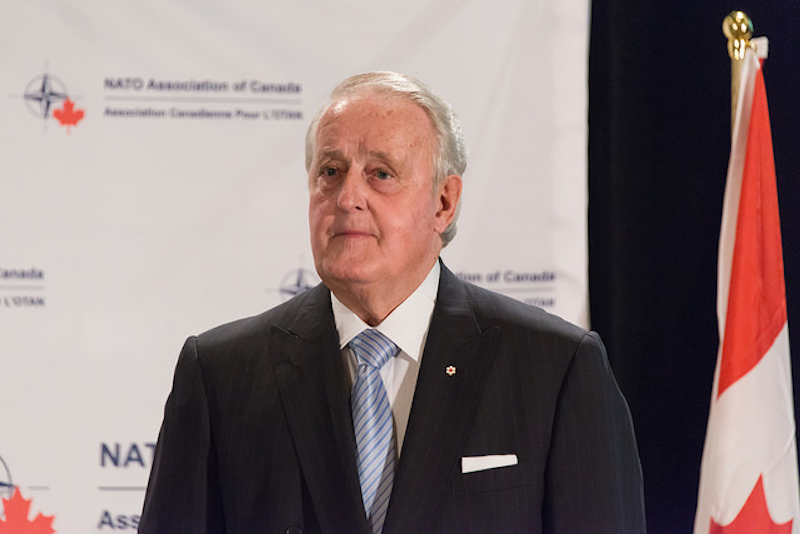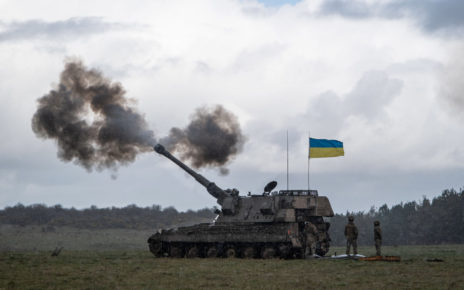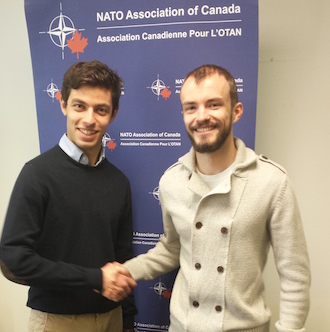Monday in Toronto
On Monday June 20, 2016, Former Prime Minister Brian Mulroney spoke at the NATO Association of Canada, where he called on the Trudeau government for Canada to play a more forceful role within NATO and the UN so as to counter the threat of Russian aggression. Mulroney warned that President Putin is attempting to create a new Eurasian union dependent on Moscow, making the primary challenge now to “thwart further expansion by Russia and to ensure that those NATO members that border Russia … remain secure and firmly under NATO’s wing.”
The former prime minister argued that Canada should double its defence spending to 2 per cent of its GDP. Supporting NATO’s global security efforts should be a key Canadian defence priority. Mulroney continued by stating, “if Canada expects NATO do more on global security, we must decide to do more for NATO.” He further opined that Canada must “anchor” its aspirations by making clear commitments.
Mulroney was also critical of Trudeau’s promise to reject the Conservative government’s favoured F-35 jet, and the subsequent consideration of Super Hornets as an interim replacement. He continued that, “We need a decision on what we will buy to serve our strategic needs, not an interim purchase driven by political considerations repeating the helicopter fiasco.” This statement referred to the 1990s, when the Liberals succeeded the Conservatives. Under the Chrétien leadership, the Liberals cancelled a CAD4.4 billion purchase of EH-101 helicopters, which cost taxpayers half a billion dollars in penalties. After this, the Liberals decided buying the same EH-101 helicopters – only after the costs had risen to CAD7.6 billion.
To prevent such actions in the future, Mulroney proposed that Canada follow the Australian model and establish an independent agency to handle defence procurement through an open bidding process. He also urged Trudeau to join the US anti-ballistic missile defence system to protect Canada from countries investing in long-range nuclear missile capability.
Mulroney did, however, support Trudeau’s plans to become more engaged with the UN and its peacekeeping missions.
Wednesday in Ottawa
Prime Minister Trudeau had no answer to Mulroney’s Monday night challenge to make “tangible commitments” to NATO in dealing with Russian aggression. Instead, he promised to talk about Canada’s new approach to foreign affairs and defence problems while at his first NATO Summit in Poland next month. At a Parliament Hill press conference, he recognized that “one of the commitments that we made [during the federal elections] … [was] to re-engage Canada in the world in positive ways.”
Trudeau also hinted that he would bring other news for Canada’s NATO allies to Poland; many of whom have been urging Canada to commit to sending troops to Eastern Europe. He said, “we will have more to say about how we will continue to live up to our responsibilities, and … to the expectations that people have around Canada.”
Canada is in the process of considering a NATO request to send more troops to the region, specifically Ukraine, to defend its sovereignty in light of the annexation of Crimea.
Should Canada Join NATO’s Eastern Europe Mission?
The upcoming Warsaw Summit is designed to force member states to make important decisions about Eastern Europe. The recent meeting of defence ministers made it clear that NATO will send 4,000 troops to Eastern Europe on a mission to deter Russian aggression and re-assure allies. The task is designed to protect the four countries most threatened by Russia in the aftermath of Crimea: Latvia, Lithuania, Estonia, and Poland. The plan is to put 1,000 troops in each country, led by a designated “framework nation” to deter Russia from attacking them.
Currently, only the US, UK, and Germany have agreed to be framework nations. Denmark and Norway declined to be a combined fourth, leading to immense pressure on Canada to take their place.
Many have argued that the Trudeau government should make the commitment, as it would advance their objectives – especially in garnering support for the vote to get a seat on the UN Security Council. Those in favour of the commitment believe it would give Canada a more visible role in Europe. This decision would give Canada more weight within NATO discussions, support Brussels’ claims that Canada must spend more on its defence, and encourage members of the EU to ratify the Comprehensive Economic and Trade Agreement. Furthermore, the European mission can be seen as a lower-risk, cost-effective means to prevent conflict, compared to that of the UN.
Those against Canada’s support for the mission include Russia, who in a statement at the Russian Embassy in Ottawa the day after Mulroney’s speech in Toronto, claimed that the NATO force risks distracting from ISIL and terrorism – the “real existential threat.” Calling the strengthening of the military a waste of money and resources, Russia held that “terrorists make no distinction between Russians and Canadians” and “common sense and pragmatism dictate the need to join efforts, as oppose to reincarnation of Cold War containment.”
The Trudeau government has previously stated its commitment to re-kindling friendly relations with Russia, an endeavour largely suspended under the former Conservative government. With these advancements within Eastern Europe in mind, it is important to monitor Trudeau’s actions during during his visit to Poland next month.
Photo: Brian Mulroney at the 50th Anniversary Gala of the NATO Association of Canada. Courtesy of NAOC via Flickr.
Disclaimer: Any views or opinions expressed in articles are solely those of the authors and do not necessarily represent the views of the NATO Association of Canada.




